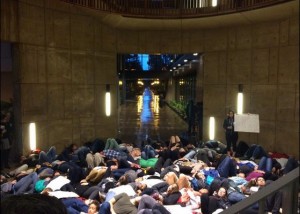Stanford Law School Offers Campus-Wide Forums on Race, Policing and the Criminal Justice System

Stanford Law School is organizing a series of events and educational programming focused on race, policing and the criminal justice system, beginning in January and running through the winter and spring quarters, which will be open to the campus community. Members of the faculty also will offer courses that directly address related issues.
“For many in the Stanford community, events in Ferguson and Staten Island have raised fundamental questions about the basic fairness of our criminal justice system,” said M. Elizabeth Magill, dean and Richard E. Lang Professor of Law at Stanford Law School. “In organizing these events, our goal is to offer a campus-wide forum where all who are interested can learn about and reflect on the legal and policy issues about race and criminal justice that recent events have made salient. It is an opportunity to learn and share ideas as part of this important national conversation.”
The first event will be a panel discussion called “Race and Policing: Moving Forward” on Tuesday, January 6, from 4:30 to 6:30 p.m. in Room 190 in the Crown Quadrangle building at the law school. Dean Magill will moderate the panel, which will include Ronald L. Davis, director of the U.S. Department of Justice’s Office on Community Oriented Policing Services and former chief of the East Palo Alto (Calif.) Police Department; Professor Ronald C. Tyler, who joined Stanford Law School in 2012 to direct the Criminal Defense Clinic after a 22-year career as an assistant federal public defender; Professor Tracy L. Meares of Yale Law School, who has served on the Committee of Law and Justice with the National Research Council since 2004 and was named to the President’s Task Force on 21st Century Policing in December; and Stanford Law School Professor David Sklansky, an expert in policing and criminal law. More details are available here.
On Monday, January 12, Stanford Law Professor Robert Weisberg, faculty co-director of the Stanford Criminal Justice Center, will join former Judge LaDoris Cordell in a discussion titled “Grand Juries: An Arcane Institution or Sacred Cow.” Judge Cordell is a 1974 graduate of Stanford Law School who serves as the independent police auditor for the City of San Jose. This program will take place from 4 to 6 p.m. in Room 180 in the Crown Quadrangle building. More information is online here.
Both events are free and open to the public. They are sponsored by the Dean’s Office, the Stanford Criminal Justice Center, the John and Terry Levin Center for Public Service and Public Interest Law, and the Stanford Law School Office of Student Affairs.
The law school will produce and host several other programs in coming months. They include a faculty-led workshop on the scope and efficacy of federal civil rights laws; discussion of proposals for relying on special prosecutors in cases of homicide by police officers; an in-depth look at the City of St. Louis; and a review of potential efforts for legislative and other reforms.
In addition to these activities, several faculty members are offering courses or reading groups that focus on some of the legal and policy questions raised by the events in Ferguson and Staten Island. Three professors—Professors Norman Spaulding and Richard Banks from the Stanford Law School and Jennifer Eberhardt from Stanford’s Psychology Department—will teach a one-unit seminar on race and policing during winter quarter, Professor David Sklansky will offer an informal (no credit) reading group on race and criminal justice, and Professor Joan Petersilia will teach a course called “Reinventing the American Criminal Justice System” during spring quarter.
Other courses will delve into equality and the law more broadly. Professor Kenneth Mack from Harvard Law School will teach a 1-unit short course in Critical Race Theory in January, Professor Barbara Fried will teach a course on Modern American Legal Thought in the winter quarter, Professor Richard Ford will teach a course on Comparative Civil Rights, and Professor Ford and Professor Bernadette Meyler will teach a 3-unit course in the spring quarter on Critical Theory. Interested students should consult the registrar’s webpage for information.
In addition, the Stanford Criminal Justice Center is compiling a list of potential research topics that can be supervised as directed research projects for students interested in doing research on racial justice issues.
Those interested in the latest news about these activities on the Stanford campus can follow hashtag #SLSforjustice on Twitter.

